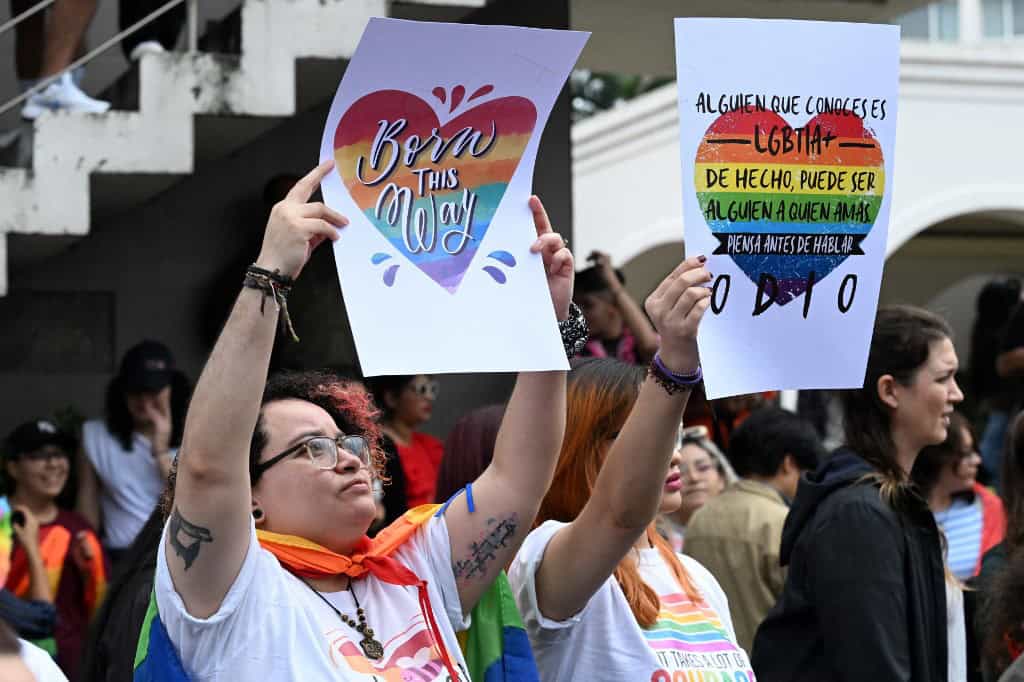Hand in hand, Andrea and Fiorella attend an improvised mass in the garage of a house in San Salvador. There they say they don’t fear being discriminated against by a society that increasingly closes spaces for sexual diversity.
Before a crucifix hanging on a column under a row of multicolored flags, about 15 members of the LGBT community sing chants, take communion, and listen to Bible passages. “It’s a safe space where I can attend with my partner, be welcomed without being judged,” said Fiorella Turchkeim, a 30-year-old psychologist.
For her and Andrea Ordóñez, a 30-year-old pharmacist, the so-called Santa María Magdalena Community, an Anglican-inspired organization that defines itself as “radically inclusive,” is “a respite” amid a climate of “intolerance.”
After being re-elected for another five years in February thanks to his anti-gang war, President Nayib Bukele has adopted a conservative policy, despite saying he supported LGBT claims before coming to power.
A week ago, Bukele announced the dismissal of 300 employees from the Ministry of Culture for promoting “agendas” incompatible with his government’s vision, which several officials celebrated as a defense of “the traditional family,” “faith,” and “life.”
Days earlier, the Ministry of Culture had approved the presentation of an LGBT play at the National Theater, abruptly canceled after its first performance.
LGBT people are left “in a vulnerable situation” when people hear the president define them as “unnatural, anti-God, anti-family,” Luis Chávez, a gay man who serves as a pastor in the religious organization that has been gathering for about two years in an NGO’s house, told AFP.
Setbacks?
Shortly after sweeping the elections, Bukele attended in February, like his Argentine counterpart Javier Milei, the largest conservative convention in the United States, which gave a standing ovation to former President Donald Trump.
That same month, the Ministry of Education announced that it removed “all traces” of gender perspective from school textbooks, a decision applauded by conservative groups and criticized by human rights activists. Bukele is entering “this small club of ultra-right mega-reactionary politicians,” opined anthropologist Juan Martínez.
Also in February, the Ministry of Health eliminated a protocol with which sexually diverse people received care “free from stigma and discrimination” in an HIV/AIDS prevention program, said Aranza Santos, from the Alejandría LGBTQI+ Collective. With the rainbow flag on her back, Turchkeim attended the Pride march last Saturday in San Salvador with her partner to demand respect for sexual diversity.
“It’s worrying (the official stance) because of the media persecution of the LGBTQI population,” she expressed amid the noise of music and the slogans of the protesters. According to the Organization of Salvadoran Women for Peace, in El Salvador “8 out of 10 LGBTQI+ people” suffer “discrimination based on their sexual orientation” or gender identity.
No to the closet
Turchkeim and Ordóñez have been a couple for two years, but their families don’t accept their relationship. “To avoid problems,” says the young pharmacist, they don’t show their affection in public.
Ordóñez recounts that a few years ago she was part of a Catholic choir, but the group’s director excluded her during Holy Week because he told her, alluding to lesbianism, that it was “an aberration.” “It was a shock to know there was no space for me,” she recalled.
“People of sexual diversity are hurt by traditional churches,” said Chávez, after explaining that although members of Santa María Magdalena attended the Anglican church, they feel freer in the improvised temple.
The government and part of society “want to deny our existence and faced with that, we have to raise our voices, demand and fight for our rights,” said Grecia Villalobos, an activist from Concavis Trans, an organization defending transgender rights. “We’re not going to allow ourselves to be stigmatized, discriminated against, and locked back in closets,” Santos adds.
The struggle will be long. Turchkeim and Ordóñez plan to marry in August 2025, but they will have to travel to Costa Rica, where same-sex unions have been legal since May 2020. “We’d like it to be here, but of course… it’s very difficult here,” Turchkeim resigns herself.






